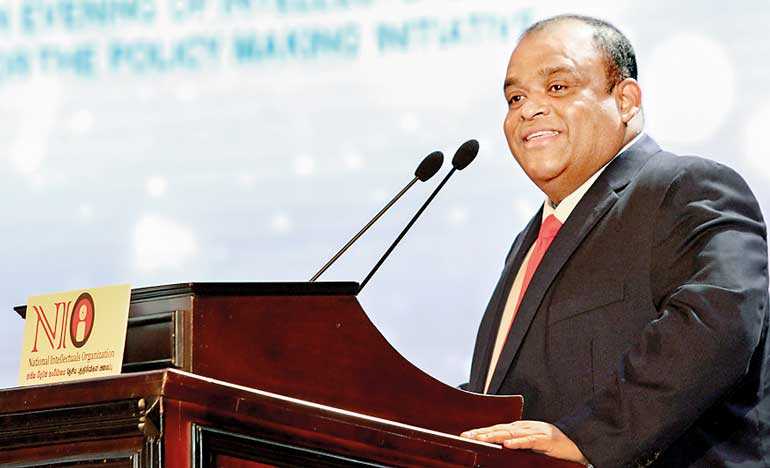Monday Feb 23, 2026
Monday Feb 23, 2026
Monday, 11 February 2019 00:51 - - {{hitsCtrl.values.hits}}

By Uditha Jayasinghe
A data-based approach to policymaking was advocated by well-known businessman Dhammika Perera to rapidly expand Sri Lanka’s economic growth, with special emphasis on education.
Perera, speaking at an event organised by the National Intellectuals Organisation (NIO), last week gave detailed ideas of what should be included in a national policy, which could be implemented by the Government.
Indicating how complex national policy making could be, Perera nonetheless recommended that education should be at the core of any policy document. NIO is planning to release a comprehensive national policy document later this month, which Perera noted should have a wide range of development goals on labour, employment creation, environmental management, entrepreneurship, exports and investment.
“Sri Lanka had the Nalanda University before the British had Oxford and Cambridge. At that time, we were far ahead of the British. Then the Nalanda University closed and no effort was made to establish another university. However, Oxford and Cambridge flourished and the British eventually became an empire that colonised us. Even today, when the world is at the cusp of huge technological advances, what is referred to as the Fourth Industrial Revolution, education is the most important thing. So if we want to develop Sri Lanka, we need to focus on education,” he said.
Extrapolating from data on Sri Lanka’s higher education system, Perera pointed out that a large number of students fail to get into State universities. He stated that popular universities such as Sri Jayewardenepura University had the space to educate double the number of its current student population but resources were unavailable.
Perera acknowledged the Government would have to funnel in a few billion initially to expand facilities but should then allow universities to generate income and expand to teach thousands of new students.
“Monash University and Sri Jayewardenepura have the same amount of space, but Monash educates thousands of students more than Sri Jayewardenepura. Why is this? We have to create a change in these institutions so they are able to educate far higher numbers of students. Facilities alone should not restrict their opportunities. If we wait on the Government to provide finances, we never move forward. Different thinking is needed.”
Education reform is crucial, Perera said, because it is closely tied to social development. With education the population can adapt to a changing economy and be more competitive to be stakeholders in a knowledge economy. The rapid advancement of -driven industries would give Sri Lanka an edge to improve exports and attract investment. It would also enable the population to adapt faster to new job opportunities.
“Sri Lanka has a labour market of about 8.2 million people. However, this number of employed people can change given different market conditions. According to the latest data, about 400,000 jobs have been lost in the Agriculture sector. This is largely because of drought where 400,000 jobs have transitioned out of agriculture. It may be that they found jobs in other sectors but such serious fluctuations should be avoided as it means that a large segment of the population is affected.”
Any national policy should have the ability to be relevant even five to 10 years from now, Perera said. Making the policy relevant to the average Sri Lankan is critical to getting stakeholder buy-in and push for implementation. Perera also suggested that the NIO should adopt policies that have been successful in other countries so that it has had real work testing.
“When someone comes to me with an idea, I ask them to tell me at least four countries where something similar has been implemented, because otherwise we just waste time figuring out whether it would work. One important thing the NIO should do is lock in the number of ministries that each government should have and ensure that even the institutions under those ministries are locked in and cannot be changed by different governments. Then this current discourse on how many ministers and what institutions they should have will all be resolved. This is how countries like Ireland, Singapore and Malaysia formulate policy.”
Having a stable State structure would allow for national policies to be implemented in a sustainable manner, he added.